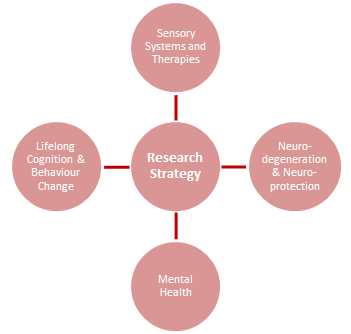Faculty Doctoral Strategies
Brain Sciences – Executive Summary
" We train outstanding postgraduate research students in experimental and applied brain sciences to address critical global research challenges through cross-disciplinary research.
Vision
Our vision is to train the next generation of researchers who will contribute to solving the greatest health and wellbeing problems in the brain sciences, in order to transform society and reduce the global burden of disease.
Mission
At the UCL Faculty of Brain Sciences we recruit outstanding national and international post-graduate research students. Our doctoral students train in experimental and applied brain sciences, often across disciplines, to address the most critical global challenges.
We offer expertise and supervision in audiology, cognitive neuroscience, language sciences, neurology, ophthalmology, psychiatry and psychology. Our research strategy includes four key themes, each encompassing research, education and enterprise activities (Figure 1).

Figure 1. FBS Research Priorities: Key Themes
We train future global leaders in research. Our doctoral graduates develop the additional transferable skills and succeed in a competitive global employment arena.
Key research and educational achievements
- The UCL Faculty of Brain Sciences is a research powerhouse with 800 post-graduate students and 1,500 staff. Our research grant income is £80 million annually.
- UCL Neuroscience is ranked 1st in Europe and 2nd worldwide (Thomson Reuters Essential Science Indicators)
- In the latest research assessment UCL was the UK's top university in Psychology, Psychiatry and Neuroscience (REF 2014).
- We recruit outstanding students in a wide distribution of nationalities and cultural backgrounds. We offer excellent infrastructure from labs and library to high performance computing. Our state-of-the-art research facilities include imaging, genetic, behavioural and a range of wet and dry lab methodologies (www.ucl.ac.uk/pals/research/research-facilities).
- We train doctoral students to the highest standards of research using engaging and innovative teaching methods. We offer blended training with e-learning, distance learning, multimedia and virtual environments. At the UCL Faculty of Brain Sciences we are the UK's and an international leader in research-based education in basic, applied and clinical neuroscience.
- Recent analysis by RAND shows that UCL had the largest number of highly cited publications of any organisation in England across all key Brain Sciences fields of study including audiology, dementias, mental health, neuroscience, ophthalmology and psychology.
- We continually improve our PhD programmes through student feedback and representation. In the latest Post-graduate Research Experience Survey over 93% of students in Brain Sciences expressed satisfaction with their supervisors and with their own skills development.
Distinctive Features / Best Practice
- Outstanding students' employment rates
-
Our students' employment rates are outstanding (www.hesa.ac.uk). They acquire discipline-specific and transferable skills such as grant and paper writing or research communication. Students experience the wealth of cross-disciplinary initiatives at UCL, thus learning how to work in interdisciplinary teams with world-renowned researchers. Our students can gain additional teaching and other professional qualifications and we support their applications for fellowships and post-doctoral opportunities. Our unique approach provides invaluable networking and employment opportunities.
- Scientific and networking opportunities
-
We offer a range of scientific and networking opportunities for students and alumni, for example the Neuroscience Symposium and the Post-graduate Symposium and many more events and meetings at our 6 Institutes (www.ucl.ac.uk/research/domains/neuroscience/events).
- Highest timely completion rates
-
We have the highest timely completion rates at UCL. Currently 88% of Brain Sciences students complete their doctorate on time. We do it by recruiting excellent candidates, the dedication of supervisors who are at the forefront of their fields and the support from our national and international funders.
Faculty website: www.ucl.ac.uk/brain-sciences
Faculty Graduate Tutor: Dr Patti Adank
 Close
Close

